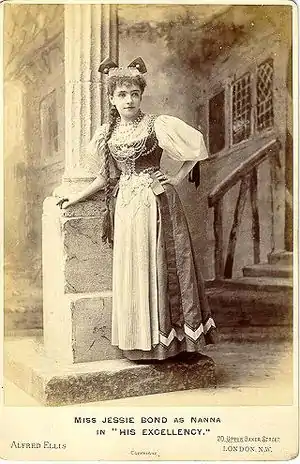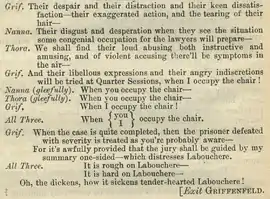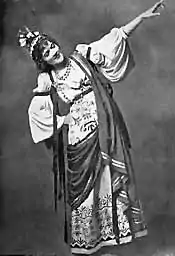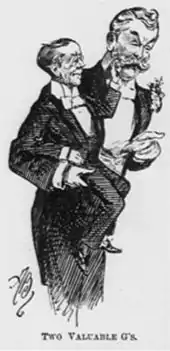His Excellency (opera)
His Excellency is a two-act comic opera with a libretto by W. S. Gilbert and music by F. Osmond Carr. The piece concerns a practical-joking governor whose pranks threaten to make everyone miserable, until the Prince Regent kindly foils the governor's plans. Towards the end of the Gilbert and Sullivan partnership, Arthur Sullivan declined to write the music for this piece after Gilbert insisted on casting his protege, Nancy McIntosh, in the lead role; Sullivan and producer Richard D'Oyly Carte, proprietor of the Savoy Theatre, did not feel that McIntosh was adequate.

The opera premiered instead under the management of George Edwardes in 1894 at the Lyric Theatre, running for 162 performances. It starred many of the Savoy Theatre regulars, such as George Grossmith, Rutland Barrington and Jessie Bond, as well as Ellaline Terriss, who was to become a major West End star. It was also produced in New York in 1895, and in German translation at the Carltheater, Vienna, in both 1895 and 1897. The opera also enjoyed a British provincial tour.
Background
From the late 1870s through the 1880s, Gilbert wrote a series of successful comic operas, working almost exclusively with Arthur Sullivan. The Gilbert and Sullivan partnership dissolved for several years after the production of The Gondoliers (1889), because of a financial dispute, but in 1893 they reunited to write Utopia, Limited. Encouraged by the modest success of this piece, the two agreed to write a new piece. In January 1894, Gilbert was ready with the scenario for a libretto that would become His Excellency, and which he hoped Sullivan would set to music. But the two collaborators disagreed over the casting of the leading lady. Gilbert insisted on using his protege, Nancy McIntosh, in the part, who had played the heroine in Utopia. Sullivan and producer Richard D'Oyly Carte, along with many of the critics, had found her unimpressive and did not want her in any more of his operas. The two men were not able to settle their differences, and Gilbert and Sullivan once again had to find different partners.

By 1894, the popular trend on the London stage had moved from traditional comic opera to a new genre, musical comedy, with such shows as The Gaiety Girl becoming quickly popular. Gilbert added elements of the new genre to his later works. In the case of His Excellency, after approaching George Henschel unsuccessfully, Gilbert selected Carr as the composer for the new piece. Carr had enjoyed success in musical comedy, with In Town (1892), Morocco Bound (1893) and Go-Bang (1894), but critics inevitably found him inferior to Sullivan.[1][2][3]
In His Excellency, among other satiric targets, Gilbert ridicules Henry Labouchère's claims to impartiality in the song "When a gentleman supposes". Labouchère, whose lover Henrietta Hodson feuded with Gilbert in 1877,[4] had been a frequent theatrical critic of Gilbert's.[5] Labouchère founded a personal weekly journal, Truth, in 1877, in which he pursued his anti-semitic, anti-suffrage and anti-homosexual social agenda.[6] The journal was often sued for libel.[7]
Productions
The original production at the Lyric Theatre in London opened on 27 October 1894, and closed on 6 April 1895 after 162 performances. For the cast of His Excellency, Gilbert was able to engage former Savoy opera stalwarts George Grossmith, Rutland Barrington, Alice Barnett, Charles Kenningham and Jessie Bond, as well as John Le Hay and the young musical comedy star, Ellaline Terriss. Many of the choristers from the Savoy Theatre, who had been disappointed with the recent short run of Mirette there, joined Gilbert's production, and Helen Carte accused Gilbert of poaching the D'Oyly Carte chorus.[8] Choreography was by John D'Auban, and costumes were by Percy Anderson.
His Excellency premiered at the Lyric Theatre, London, under the management of George Edwardes, on 27 October 1894. The production and libretto received enthusiastic notices, though the score met a mixed reception.[8] After the opera opened, Gilbert wrote to Helen Carte, "if it had had the benefit of your expensive friend Sullivan's music, it would have been a second Mikado" (quoted in Wolfson 1976, p. 65). The London run of just over five months (162 performances, closing on 6 April 1895), cut short because of an influenza epidemic, was a disappointment.[9] Nevertheless, the opera had a respectable provincial tour and a Broadway production opening at the former Broadway Theatre on 14 October 1895, which ran for 88 performances.[10]
Roles

| Role | Voice type | Premiere cast 27 October 1894 |
|---|---|---|
| The Prince Regent, disguised as Nils Egilsson, a strolling player | lyric baritone | Rutland Barrington |
| George Griffenfeld, Governor of Elsinore, a practical joker | comic baritone | George Grossmith |
| Erling Sykke, a young sculptor | tenor | Charles Kenningham |
| Dr. Tortenssen, a young physician | baritone | Augustus Cramer |
| Mats Munck, Syndic of Elsinore | comic baritone | John Le Hay |
| Harold, Corporal of the King's Hussars | bass | Arthur Playfair |
| A sentry | bass-baritone | George Temple |
| First officer | speaking role | Ernest Snow |
| Second officer | speaking role | Frank Morton |
| Christina, a ballad singer | soprano | Nancy McIntosh |
| Nanna, Griffenfeld's daughter | mezzo-soprano | Jessie Bond |
| Thora, Griffenfeld's daughter | soprano | Ellaline Terriss |
| Dame Hecla Cortlandt, a lady of property, engaged to Griffenfeld | contralto | Alice Barnett |
| Blanca, a vivandière | mezzo-soprano | Gertrude Aylward |
| Elsa, a peasant girl | speaking role | May Cross |
Synopsis
The scene is laid in Elsinore, Denmark, in 1801.
Act I
The people of Elsinore celebrate a newly unveiled statue of the Prince Regent. Its creator, Erling Sykke, has been named Sculptor to the Royal Family. After the townspeople leave, Christina remains, transfixed. She tells Erling that she is in love with the statue. Erling's friend, Dr. Tortenssen, has been named Physician to the King. The two men are in love with Nanna and Thora, the daughters of Elsinore's governor, George Griffenfeld. Until now, the girls have scornfully refused the two suitors' advances. The young men hope for better luck, now that they have secured royal appointments. Nanna and Thora appear, and they appear receptive to the men's entreaties. But after the men leave, the girls admit that the appointments are a practical joke, one of many their father has perpetrated on the citizens of Elsinore.
The King's Hussars enter, led by Corporal Harold. The Governor has compelled them to dance like ballet-girls every day from 10 to 2. Griffenfeld joins them, and chastises the Hussars for their lack of a sense of humour. He admits to Harold, however, that one of his practical jokes has backfired. Just for fun, he had proposed marriage to the extraordinarily wealthy Dame Hecla Cortlandt. He now wants to break off the engagement, but he fears her dangerous temper. When she arrives, Griffenfeld asks her what she would do if, hypothetically, his proposal turned out to be a ruse. Her angry reply leaves him terrified. With his two daughters, he plots to trick Mats Munck, the local Syndic, into believing that Dame Cortlandt wants to marry Munck.
After they leave, the Prince Regent appears, in disguise, dressed as a "tattered vagabond". He has received many complaints about Griffenfeld's behaviour from the citizens of Elsinore, and he wants to see for himself if they are true. He encounters Christina, who is struck by his resemblance to the statue, but he tells her that he is a mere strolling player, Nils Egilsson. After she leaves, he encounters Griffenfeld, who also notices the resemblance. Seeing another opportunity for a practical joke, Griffenfeld asks "Egilsson" to impersonate the Prince Regent – dispensing fake honours to the townspeople, which will later be revealed as amusing hoaxes. Christina overhears their agreement, but left alone with the Regent once again, promises not to divulge their secret.
Mats Munck has a meeting with Dame Cortlandt, in which she believes she is consulting him on arrangements for her marriage with Griffenfeld, but Mats believes that she plans to marry him. Dame Cortlandt finds his behaviour incomprehensible. Erling and Tortenssen now learn that their court appointments are a sham. Nanna and Thora reject their marriage proposals, given their impoverished status. Fed up with Griffenfeld's incessant practical jokes, Erling and Tortenssen assemble the townspeople, and are joined by Dame Cortlandt, who has realised what is going on, and they plan to go to Copenhagen to complain to the Prince personally. When Griffenfeld arrives, he tells them that the Regent is already in Elsinore to hear their complaints. The chorus are jubilant that their grievances will finally be heard, while Griffenfeld and his daughters pretend to be alarmed and to beg for mercy.
Act II
The people of Elsinore await their audience with the Regent. Mats Munck has drawn up their complaints in a formal legal document. Christina assures them that she foresees the Governor's downfall. Nanna and Thora beg forgiveness for their father, but the crowd will have none of it. Finally, the Regent arrives in a great ceremony. As evidence of the Governor's practical jokes, Harold and the Hussars dance a ballet for him. The Regent announces that Erling and Tortenssen's previous appointments are confirmed, and they are elevated to the nobility. Corporal Harold is promoted to Colonel, Mats Munck is promoted to Governor, and Griffenfeld is degraded to the rank of Private. Lastly, he commands that Erling and Tortenssen marry Griffenfeld's daughters, and he invites the whole village to a banquet at the castle. After the chorus have left, Griffenfeld tells "Egilsson" that he is pleased with how well the joke is working. He ignores that his joke on Dame Cortlandt backfired.
Harold is enjoying his new rank. He and Blanca decide to write a three-volume novel about their lives. Meanwhile, Dame Cortlandt once again confronts Mats Munck. She insists that she was engaged to the Governor. Now that Mats is Governor, she is engaged to him, but now he is not interested. Mats asks a nearby sentry if he is obliged to marry her. Griffenfeld changes places with the sentry, and says that he must. Griffenfeld is delighted that, once again, all of his practical jokes are working beautifully, but his daughters are starting to feel some remorse over their treatment of Erling and Tortenssen. The new nobles make a pretence of behaving haughtily towards the young ladies, but soon crumble before the feminine tears. Left alone, the girls finally admit that they have real feelings for the men.
Everyone gathers for the weddings, but Griffenfeld abruptly announces that the Regent's visit was a sham, and all of the honours he dispensed were practical jokes. But "Egilsson" turns the tables, and announces that he is the real Regent. All of the honours are to become permanent, and likewise Griffenfeld's demotion to the rank of Private is confirmed. The Regent asks Christina to marry him, and all of the couples are happily united.
Musical numbers
- Act I
- 1. Set the merry bunting flying – Erling, Christina
- 2. When I bestow my bosom's store – Erling
- 3. Oh my goodness, here's the nobility! – Nanna and Thora
- 4. If all is as you say – Nanna, Thora, Erling and Tortenssen
- 5. Here are the warriors all ablaze – Chorus of Girls
- 6. Now what would I do if you proved untrue – Dame and Governor
- 7. Oh what a fund of joy – Nanna, Thora and Governor
- 8. A King who is pestered with cares – Regent
- 9. Now if you would atone – Regent and Governor with Christina
- 10. Now all that we've agreed upon, O – Dame and Syndic
- 11. My wedded life – Nanna
- 12. Finale: Come hither, ev'ry one – Company
- Act II
- 1. With anger stern ... A hive of bees, as I've heard say – Chorus; Christina and Regent
- 2. Quixotic is his enterprise – Governor
- 3. There once was a corporal bold – Harold and Blanca
- 4. One day the Syndic of this town – Syndic, Dame, Sentry and Griffenfeld
- 5. When a gentleman supposes – Nanna, Thora and Governor
- 6. So this is how you'd have us sue you – Thora, Nanna, Erling and Tortenssen
- 7. Ring the bells and bang the brasses! – Chorus
- 8. Finale: Now all that we've agreed upon, O – Company
Critical reception
The Times praised Gilbert's libretto, rating it his best since The Mikado. The paper thought Carr's music an inferior copy of the Sullivan style, but nevertheless better than "that more vulgar mould in which he has found favour with the purveyors of variety entertainments." The paper judged the cast "exceptionally strong". Its comments on Nancy McIntosh accorded, to some degree, with Sullivan's: "[She] has of late made rapid progress and has become an actress of decided skill and charm, though her voice and singing are scarcely as good as they were when she came out."[1] The Manchester Guardian concurred, attributing the "undeniable triumph" of the piece solely to Gilbert's "inventive genius as a librettist and stage manager."[2] The Saturday Review rated Gilbert's libretto "a pretty fair specimen" of "genuine Gilbertian humour", but lamented the absence of Sullivan; of Carr's contribution, it said, "the music is neat, easy, the technical writing skilful, the orchestration correct; in fact there is nothing wrong with it. And this is the gravest reproach one can make to a writer of opéra-bouffe music – plenty should be the matter with it."[3] The critic of The Theatre disagreed with the positive assessments, calling the libretto "the worst that Mr. Gilbert ever wrote – worse even than The Mountebanks, which was bad enough."[11]
See also
Notes
- "Lyric Theatre", The Times, 29 October 1894, p. 12
- "Production of Mr. W. S. Gilbert's New Comic Opera", The Manchester Guardian, 29 October 1894, p. 8
- "His Excellency at the Lyric Theatre", The Saturday Review, 3 November 1894, p. 481
- Vorder Bruegge, Andrew (Winthrop University). "W. S. Gilbert: Antiquarian Authenticity and Artistic Autocracy" Archived 3 May 2011 at WebCite. Paper presented at the Victorian Interdisciplinary Studies Association of the Western United States annual conference in October 2002, accessed 26 March 2008
- Stedman, pp. 157 and 255
- Hirshfield, Claire. "Labouchere, Truth and the Uses of Antisemitism", Victorian Periodicals Review, Vol. 26, No. 3 (Fall, 1993), pp. 134–142
- The Times, 31 December 1957, p. 6
- Howarth, Paul. "His Excellency: Background Notes". The Gilbert and Sullivan Archive, 28 December 2008, accessed 28 November 2010
- Ainger, p. 356
- "His Excellency, the English Operetta, at The Broadway Theatre", The New York Times, 15 October 1895, p. 5
- Adams, W. Davenport, "The Decline of Comic Opera", The Theatre, 1 October 1895, p. 203
References
- Ainger, Michael (2002). Gilbert and Sullivan – A Dual Biography. Oxford University Press. ISBN 0-19-514769-3.
- Crowther, Andrew (2000). Contradiction Contradicted – The Plays of W. S. Gilbert. Associated University Presses. ISBN 0-8386-3839-2.
- Stedman, Jane W. (1996). W. S. Gilbert, A Classic Victorian & His Theatre. Oxford University Press. ISBN 0-19-816174-3.
- Wolfson, John (1976). Final Curtain – The Last Gilbert and Sullivan Operas. London: Chappell & Company Limited.
External links
- His Excellency at The Gilbert & Sullivan Archive
- Article about His Excellency, with several photos of the cast, in The Sketch, 1894
- His Excellency at The Gilbert & Sullivan Discography
- Vocal score of His Excellency
- Libretto of His Excellency
- MIDI files of His Excellency
- Programme from the original production
- Review of His Excellency in The Times, 29 October 1894
